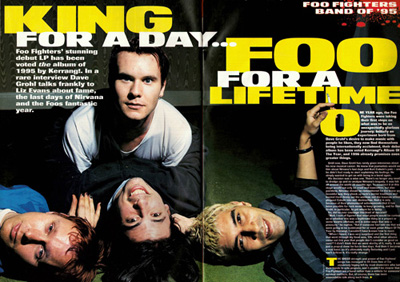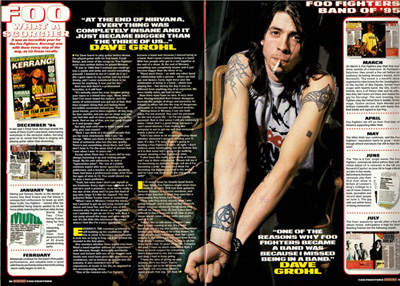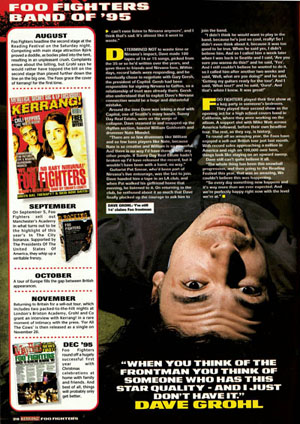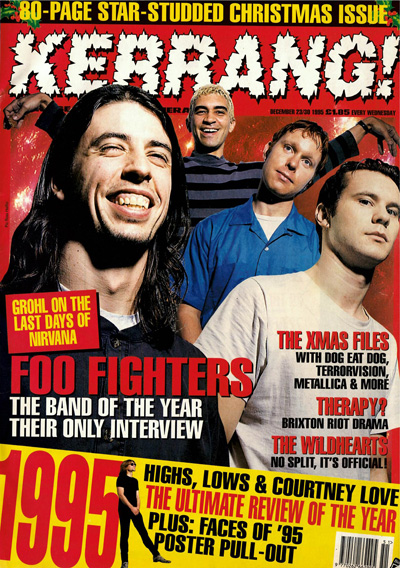Until now, Dave Grohl has rarely given interviews about his new musical career. He knew that journalists would ask him about Nirvana's last days and Kurt Cobain's pain - and he didn't feel ready to start explaining his feelings. He simply wanted to get on with being in a band again.
His decision was a wise one. There's no longer any need to dredge up and re-analyse Nirvana's tragedy. It was felt at around the world 20 months ago. To resurrect it at this stage would not only be cruel and insensitive, but also pointless. Nirvana should be remembered for the brave and beautiful way they shook up rock's sorrier traditions and booted them firmly out the window, not the traumas which plagued Cobain into self-destruction. And it is only because of their phenomenal achievements that it has been possible for rock music to keep growing, and for Dave Grohl, in particular, to get where he is today.
So, did he ever envisage this level of success?
"Well, I sort of figured that most people would be curious as to whether this was a legitimate thing or a project or some bizarre offshoot, and in some ways that was a pressure," he replies. "But if someone had told me that we were going to be nominated for or even given Album Of The Year by Kerrang!, I wouldn't have known how to react.
"When I heard, I was very surprised and the first thing that went through my head was, 'OK, what other albums came out this year that people don't consider as good as ours?'! I didn't think that we were worthy of it, really. It was just a project done for fun in five days. And then it became a real band, so it's ultimately really flattering and I just can't believe it. It's really strange."
The Sheer strength and power of Foo Fighters' songs has managed to lift Dave free of the unsavoury legacy left by most drummers who turn their hands to solo projects, and it couldn't be clearer that Foo Fighters are a band rather than a vehicle for someone's survival instincts. But, of course, there has been unavoidable talk along such lines.
Yet Dave learnt to play guitar before drums, (he played guitar with his first band, Freak Baby), and some of the songs on 'Foo Fighters' were even written before he joined Nirvana.
"It was in 1989 that I realised you could go into a studio and write and record everything yourself. I wanted to see if I could do it so I did. I gave tapes to my mother and my friend Jimmy, and I never considered them to be demos for anything. It was just for fun."
And now that there's a professional incentive, is it still fun?
"It's actually more fun now. Imagine giving
your tapes to a friend who says, 'Wow, who's
this? I've never heard this before', and the
sense of achievement you get out of that. And
 then imagine doing that and having three
incredible musicians behind you. You're all
good friends, you've been together all day long
for four months, and you get on stage and you
can feel this wall of noise pounding you in the
back. And on top of that, you can jump around
to it and people clap!"
then imagine doing that and having three
incredible musicians behind you. You're all
good friends, you've been together all day long
for four months, and you get on stage and you
can feel this wall of noise pounding you in the
back. And on top of that, you can jump around
to it and people clap!"
But why wait until now to front a band and play your own music?
"Well, I can think of a thousand people that are far more charismatic than I am," he shrugs. "When you think of the frontman, you think of someone who has this star quality. There's just something about them, and I just don't have it. I'm the same kind of person that I was when I was 14 years old."
Except when Dave was 14 years old he was always hamming it up and making people laugh. By his own admission, he was a "hyperactive joker". The son of a public relations expert who wrote speeches for politicians, and a teacher of public speaking, Dave had been a professional stage actor from the ages of nine to 12. You could almost say he was a born performer.
"Yeah, but even now I don't see myself as the frontman. Every night I turn and look at Pat and he's such a presence, so to me he really is the star of the show and I'm just this kind of guy who sings. It's like the (lapsed '70s star guitarist) Robin Trower band or something!
"When I was in Nirvana I loved the music, but I wanted to get up and jump around and dance and have fun, and that's one of the reasons why I hit the drums so fucking bard - cos I wanted to get up out of my seat. Now I can jump around the stage and wear myself out. It's the little bits inbetween the songs where I feel like I'm a joke, you know."
Evidently, the extrovert prankster is I still building up his confidence. With this in mind, it becomes apparent why it took him so long to leap out from behind the drumkit in the first place.
One wonders whether Dave would ever have fitted a band together without his experience with Nirvana, though. Achieving worldwide fame and fortune with one of the biggest rock bands ever must have given him a measure of confidence, not to mention an insight into the industry. It also reminded him of the importance of music in his life, as opposed to the accompanying circus.
 "One of the reasons why Foo Fighters became a band was because I missed being in a band. And I mean I missed being in a band. with four people who get in a van together at the end of a show. At the end of Nirvana, everything was completely insane and it just became bigger than the three of us.
"One of the reasons why Foo Fighters became a band was because I missed being in a band. And I mean I missed being in a band. with four people who get in a van together at the end of a show. At the end of Nirvana, everything was completely insane and it just became bigger than the three of us.
"There were times - as with any other band or relationship with a person - where we had ups and downs. Every night there was the celebration of being in a band - which was playing live - but during the day it was so different from anything any of us expected. We were totally naive, we had no idea."
Now Dave does have an idea. A very clear idea. Having watched Kurt Cobain disappear beneath the weight of drugs and paranoia, he refuses to either fall into the trap of dangerous obsession or to become an affected asshole.
"Having been in Nirvana, I can see both
sides. I'm not worried. You can't be paranoid
for the rest of your life - so I'm not totally
paranoid. And in that sense I still am relatively
naive. I think that's a good thing, because I
can't stand distrust; I hate feeling like
everyone is out to get me and that everyone
wants a piece of me.
"Life's too short to sit around worrying about whether someone's going to bootleg your T-shirt. It's like, fuck man, if a kid's going to bootleg a Foo Fighters T-shirt, all right. I don't endorse mass bootlegging, but the bottom line of it is that some kid's going to be walking around wearing a Foo Fighters T-shirt.
"I also have this really great circle of friends and I say to them sometimes, 'Please tell me if I'm becoming an asshole. Please tell me if I'm becoming a jerk!'. Sometimes I think I'm becoming the biggest asshole in the world, and so I just ask them to hit me and get it over with!"
If it hadn't been for Seattle band Seven Year Bitch, Foo Fighters might never have made it. In 1993, SYB lost their guitarist, Stefanie Sargent to a heroin overdose, and when Dave was lost in grief they sent him a card saying they knew how he felt.
"They said they knew exactly what I was going through, and it made me feel so much better, because obviously things were very difficult for a long time. At first it was even difficult to listen to music at all. One of your songs would come on the radio and you'd switch it off.
"I don't like to talk about whether I saw Kurt's death coming or not. It's a valid question, but it's my one cookie-cutter answer where I say there has to be a line drawn. So many people have asked me that, but I can't answer it. But after I got that card from Seven Year Bitch, I realised that fuck, this is all I've done for the last 12 years of my life. I respect the past, I have so much respect for Kurt, I have so much respect for everything that's happened to me, but I couldn't just stop. I had to keep going.
"I hate the idea of giving up and, anyway, life's too short. You're lucky if you get to be 80 years old, and that's not very long. There's some people that say, 'Oh God, I can't even listen to Nirvana anymore', and I think that's sad. It's almost like it went to waste."
 Determined not to waste time or Nirvana's impact, Dave made 100 tapes of 14 or 15 songs, picked from the 35 or so he'd written over the years, and gave them to friends and Nirvana fans. Within days, record labels were responding, and he eventually chose to negotiate with Gary Gersh, the president of Capitol. Gersh had been responsible for signing Nirvana to Geffen, so a relationship of trust was already there. Gersh also understood that to exploit Dave's Nirvana connection would be a huge and distasteful mistake.
Determined not to waste time or Nirvana's impact, Dave made 100 tapes of 14 or 15 songs, picked from the 35 or so he'd written over the years, and gave them to friends and Nirvana fans. Within days, record labels were responding, and he eventually chose to negotiate with Gary Gersh, the president of Capitol. Gersh had been responsible for signing Nirvana to Geffen, so a relationship of trust was already there. Gersh also understood that to exploit Dave's Nirvana connection would be a huge and distasteful mistake.
Around the time Dave was inking a deal with Capitol, one of Seattle's many bands, Sunny Day Real Estate, were on the verge of collapse, Dave steamed in and snapped up the rhythm section, drummer William Goldsmith and bassist Nate Mendel.
"There are so few drummers like William and so few bass players like Nate, because Nate is so creative and William is so powerful. And there is no way I'd have done it with any other people. If Sunny Day Real Estate hadn't broken up I'd have released the record, but it wouldn't have been with a band, no way."
Guitarist Pat Smear, who'd been part of Nirvana's live entourage, was the last to join. Dave handed him a tape in an LA club, and when Pat walked his girlfriend home that evening, he listened to it. On returning to the club, he enthused about it so much that Dave finally plucked up the courage to ask him to join the band.
"I didn't think he would want to play in the band, because he's just so cool, really! So I didn't even think about it, because it was too good to be true. When he said yes, I didn't believe him. And so I called him a week later when I was back in Seattle and I said, 'Are you sure you wanna do this?' and he said, 'Yes'. And I still couldn't believe he wanted to do it so I called Mini after another two weeks and said, 'Well, what are you doing?' and he said, 'Getting my guitars ready for the tour'. And I said, 'What tour?' and he said, 'Ours!'. And that's when I knew. It was great!"
Foo Fighters played their first show a keg party in someone's bedroom. They played their second show as the opening act for a high school covers band in California, where they were working on the album. A support slot with Mike Watt across America followed, before their own headline tour. The rest, as they say, is history.
To round off an amazing year, the Foos have enjoyed a sell-out British tour just last month. With record sales approaching a million in America and nigh on 100,000 over here, things look like staying on an upward sweep.
Dave still can't quite believe it all.
"The whole thing has been this snowball progression, and then going to the Reading Festival this year, that was so amazing, We couldn't believe this was happening.
"So every day something new happens and it's way more than we ever expected. And we're perfectly happy right now with the level we're at."

